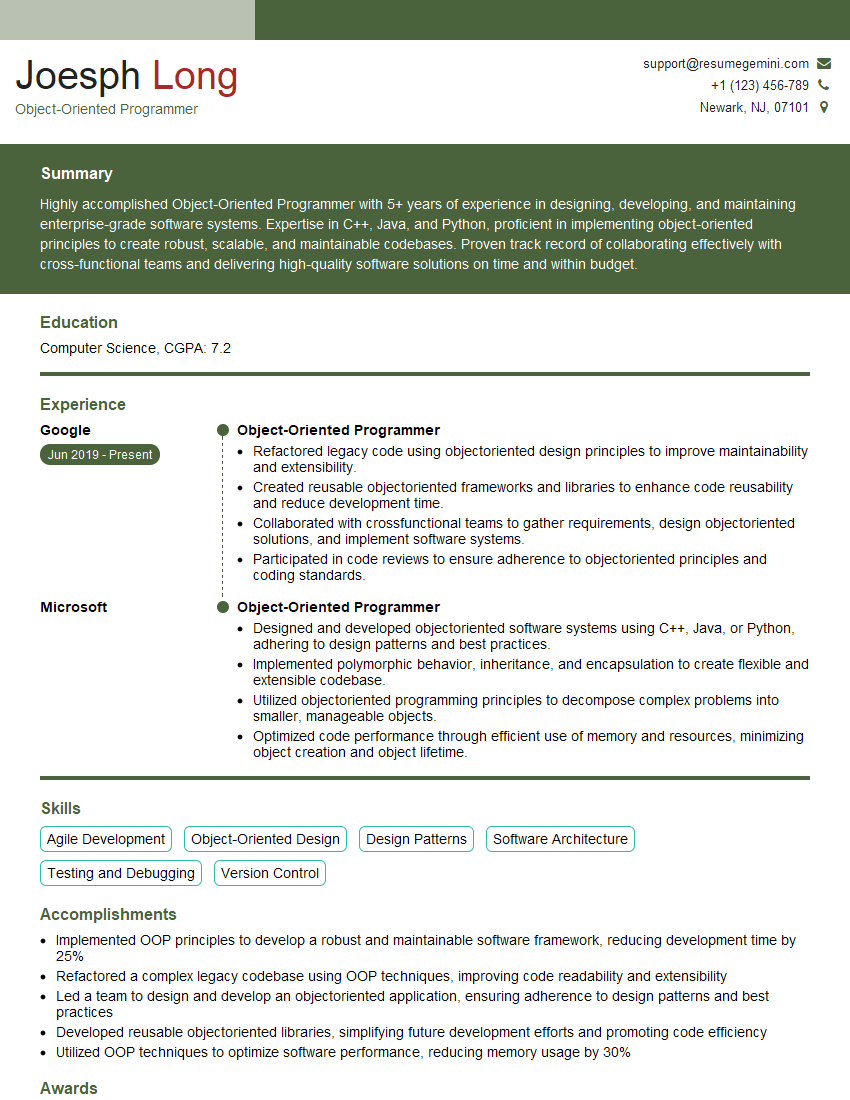Are you a seasoned Object-Oriented Programmer seeking a new career path? Discover our professionally built Object-Oriented Programmer Resume Template. This time-saving tool provides a solid foundation for your job search. Simply click “Edit Resume” to customize it with your unique experiences and achievements. Customize fonts and colors to match your personal style and increase your chances of landing your dream job. Explore more Resume Templates for additional options.

Joesph Long
Object-Oriented Programmer
Summary
Highly accomplished Object-Oriented Programmer with 5+ years of experience in designing, developing, and maintaining enterprise-grade software systems. Expertise in C++, Java, and Python, proficient in implementing object-oriented principles to create robust, scalable, and maintainable codebases. Proven track record of collaborating effectively with cross-functional teams and delivering high-quality software solutions on time and within budget.
Education
Computer Science
May 2015
Skills
- Agile Development
- Object-Oriented Design
- Design Patterns
- Software Architecture
- Testing and Debugging
- Version Control
Work Experience
Object-Oriented Programmer
- Refactored legacy code using objectoriented design principles to improve maintainability and extensibility.
- Created reusable objectoriented frameworks and libraries to enhance code reusability and reduce development time.
- Collaborated with crossfunctional teams to gather requirements, design objectoriented solutions, and implement software systems.
- Participated in code reviews to ensure adherence to objectoriented principles and coding standards.
Object-Oriented Programmer
- Designed and developed objectoriented software systems using C++, Java, or Python, adhering to design patterns and best practices.
- Implemented polymorphic behavior, inheritance, and encapsulation to create flexible and extensible codebase.
- Utilized objectoriented programming principles to decompose complex problems into smaller, manageable objects.
- Optimized code performance through efficient use of memory and resources, minimizing object creation and object lifetime.
Accomplishments
- Implemented OOP principles to develop a robust and maintainable software framework, reducing development time by 25%
- Refactored a complex legacy codebase using OOP techniques, improving code readability and extensibility
- Led a team to design and develop an objectoriented application, ensuring adherence to design patterns and best practices
- Developed reusable objectoriented libraries, simplifying future development efforts and promoting code efficiency
- Utilized OOP techniques to optimize software performance, reducing memory usage by 30%
Awards
- OOP Excellence Award for Best ObjectOriented Design Patterns
- Recognized for Exceptional OOP Programming Skills at the National Coding Competition
- Won First Prize in the OOP Programming Hackathon, showcasing innovative objectoriented concepts
Certificates
- Java Certified Professional
- Certified Professional for Object-Oriented Programming
- Microsoft Certified: Azure Developer Associate
- AWS Certified Solutions Architect – Associate
Career Expert Tips:
- Select the ideal resume template to showcase your professional experience effectively.
- Master the art of resume writing to highlight your unique qualifications and achievements.
- Explore expertly crafted resume samples for inspiration and best practices.
- Build your best resume for free this new year with ResumeGemini. Enjoy exclusive discounts on ATS optimized resume templates.
How To Write Resume For Object-Oriented Programmer
- Highlight your strong understanding of object-oriented programming concepts, design patterns, and software architecture.
- Showcase your proficiency in multiple object-oriented programming languages, such as C++, Java, or Python.
- Quantify your accomplishments and provide specific examples of how your contributions have impacted software quality and project success.
- Emphasize your ability to work effectively in a team environment and collaborate with other developers and stakeholders.
Essential Experience Highlights for a Strong Object-Oriented Programmer Resume
- Design and develop object-oriented software systems from scratch, adhering to industry best practices and design patterns.
- Implement polymorphic behavior, inheritance, and encapsulation to create flexible and extensible codebases.
- Optimize code performance through efficient use of memory and resources, minimizing object creation and object lifetime.
- Refactor legacy code using object-oriented design principles to improve maintainability and extensibility.
- Create reusable object-oriented frameworks and libraries to enhance code reusability and reduce development time.
- Collaborate with cross-functional teams to gather requirements, design object-oriented solutions, and implement software systems.
- Participate in code reviews to ensure adherence to object-oriented principles and coding standards.
Frequently Asked Questions (FAQ’s) For Object-Oriented Programmer
What is object-oriented programming?
Object-oriented programming (OOP) is a programming paradigm that revolves around the concept of objects. In OOP, data is bundled together with methods that operate on that data, forming objects. This approach promotes code modularity, reusability, and maintainability.
What are the key principles of OOP?
The key principles of OOP include encapsulation, abstraction, inheritance, and polymorphism. Encapsulation binds data and methods together into objects, abstraction hides implementation details, inheritance allows classes to inherit properties and methods from parent classes, and polymorphism enables objects to behave differently based on their class.
What are the benefits of using OOP?
OOP offers numerous benefits, including increased code reusability, improved code maintainability, enhanced code extensibility, and better code organization. By organizing code into objects, OOP makes it easier to manage complex systems and reduces the likelihood of errors.
What are the different OOP programming languages?
There are many different OOP programming languages available, including C++, Java, Python, C#, and Ruby. Each language has its own strengths and weaknesses, so it’s important to choose the right language for the specific project requirements.
What are the career prospects for Object-Oriented Programmers?
Object-Oriented Programmers are in high demand due to the widespread adoption of OOP in software development. With the increasing complexity of software systems, OOP has become essential for managing and organizing code effectively. As a result, Object-Oriented Programmers can expect excellent career prospects and job security.
What are the skills required to become an Object-Oriented Programmer?
To become an Object-Oriented Programmer, you need a strong foundation in computer science fundamentals, including data structures, algorithms, and software design. Proficiency in at least one OOP programming language is also essential. Additionally, skills in Agile development, software architecture, and testing and debugging are highly valued.